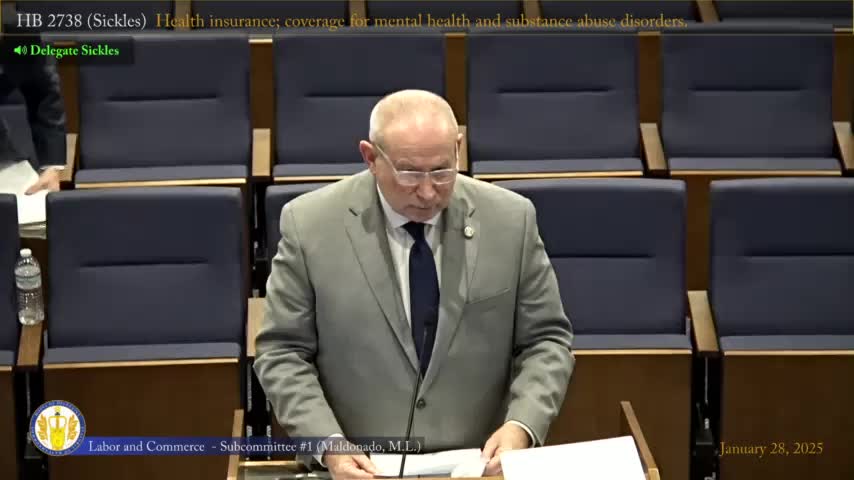Substitute approved to set "generally accepted standards of care" for mental health and substance use treatment
Get AI-powered insights, summaries, and transcripts
Subscribe
Summary
The subcommittee approved HB2738 (with substitute) to define "generally accepted standards of care" and clarify medical necessity and utilization review for mental health and substance use disorder services; the substitute passed 5‑2 after testimony from providers, parents and advocacy groups.
Delegate Sickles presented House Bill 2738 with a substitute that aims to add statutory clarity to definitions used in mental health and substance use disorder coverage, including a definition of "generally accepted standards of care," a clarified definition of "medically necessary," and criteria for utilization review.
Why it matters: witnesses described insurance denials that restrict access to evidence‑based behavioral treatments. Brian McCann, president and CEO of the Faison Center, said his organization shut a center‑based ABA program after repeated insurance denials and that insurer guidelines lacked transparency. "No board‑certified behavior analyst would tell you that being too old or having a low IQ means you can't benefit from ABA therapy," McCann said, arguing for standards grounded in clinical practice.
Supporters included parents, clinicians and advocacy groups who said inconsistent insurer standards create arbitrary denials, administrative burdens and reduced access to therapy. Opponents and cautious stakeholders, including the Virginia Association of Health Plans, said the substitute improved the language but expressed concern that parts of the definition of "generally accepted standards" could prevent plans from using standardized guidelines. The association said it had discussed proposed language with the patron and sought minor clarifying edits.
Committee action: the subcommittee adopted a substitute and reported HB2738 with the substitute by a vote of 5‑2.
What the substitute does: the substitute adds statutory language intended to align utilization review and medical necessity determinations with clinical practice and parity requirements, and it requires insurers to apply transparent, evidence‑based standards. The substitute was supported by multiple behavioral health providers and family advocates and opposed in part by health plans that requested continuing dialogue on the final definitions.
Next steps: the bill will proceed with the approved substitute; sponsors and the Bureau of Insurance indicated they will continue technical discussions to clarify implementation details and reduce unintended consequences for both providers and carriers.
